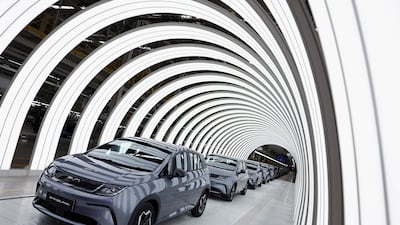The European Union has moved ahead with plans to impose provisional tariffs on electric vehicles imported from China that would raise rates as high as 48 per cent, a step likely to escalate trade tensions with Beijing.
The EU confirmed in a news release on Thursday that it would apply the duties on three Chinese manufacturers that were sampled under its anti-subsidy investigation.
MG maker Saic Motor faces a 37.6 per cent tariff on top of the existing 10 per cent rate, while Volvo Cars owner Geely and BYD will be hit with additional charges of 19.9 per cent and 17.4 per cent, respectively.
Other EV producers in China that co-operated with the investigation but have not been sampled will be subject to a weighted average duty of 20.8 per cent, while firms that did not co-operate face an additional 37.6 per cent levy.
The provisional duties will apply as of Friday, and definitive duties would kick in by November unless the two sides find an alternative solution or a qualified majority of EU member states block the final move.
Tesla may receive an individually calculated duty rate at that definitive stage following a request to be sampled.
The EU said its probe concluded that China subsidises its EV industry to a degree that causes economic harm to the bloc’s car makers. It said talks with China have intensified in recent weeks.
“Those talks with China are ongoing,” Valdis Dombrovskis, an executive vice president of the European Commission, said in an interview on Bloomberg Television.
“Should a mutually beneficial solution emerge, we can also find ways then not to apply … the definitive tariffs. But it’s very clear that this solution needs to resolve this market distortion we’re currently having.”
Beijing has warned the move could affect imports of European agricultural goods, aviation and cars with large engines. China could also decide to challenge the EU’s probe at the World Trade Organisation.
“We are not seeing the basis for retaliation as what we are conducting is indeed in line with WTO rules,” Mr Dombrovskis said.
The EU and China have been consulting on a way forward and the two sides plan to continue conversations over the next four months.
For Brussels, any solution has to be grounded in WTO rules and address the underlying harmful subsidies the probe has identified.
Beijing has looked to transform the investigation into a negotiation and has been trying to divide member states by pressuring them bilaterally, Bloomberg previously reported.
Some member states, including Germany, have been pushing for a negotiated compromise.
In talks between the two sides, China had asked the EU not to introduce the provisional measures at all or to consider lower rates based on fewer criteria and then increase them in November if a solution could not be found before definitive tariffs are due, according to people familiar with the matter.
Beijing has also asked whether the rates can be adjusted between now and November if the situation changes as the two sides continue to talk, the sources said.
Though rates can be tweaked during the process, the EU’s preference is to first establish a common understanding of the facts before exploring a mutually agreed solution that adheres to WTO rules, they added.
Technical talks between the two sides will resume in the coming days, they added.
The provisional duties are being introduced by a guarantee, and would be collected only if and when definitive duties are imposed, the EU said in a statement last month. The EU is expected to issue guidance on the form the guarantees will take.
Zhejiang Geely Holding Group and BYD declined to comment on Thursday. Saic did not immediately respond to a request for comment.
The tariffs will probably cut imports from China by a quarter, amounting to roughly $4 billion, according to an estimate by Moritz Schularick, president of Germany’s Kiel Institute for the World Economy.
Many European car makers have said they are opposed to higher tariffs, with companies such as Mercedes-Benz Group and Volkswagen warning against them. China is the biggest market for Mercedes, VW and BMW.
BMW chief executive Oliver Zipse said the tariffs are a “dead end” and will not strengthen European car makers.
“On the contrary: it not only harms the business model of globally active companies, it also limits the supply of electric cars to European customers and can therefore even slow down decarbonisation in the transport sector,” he said in a statement.

